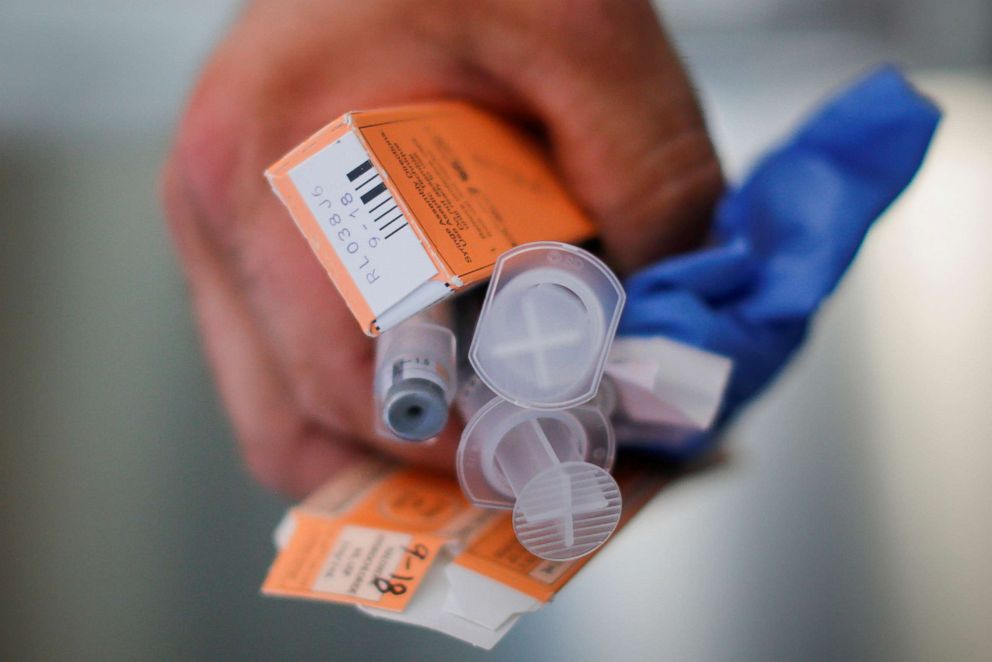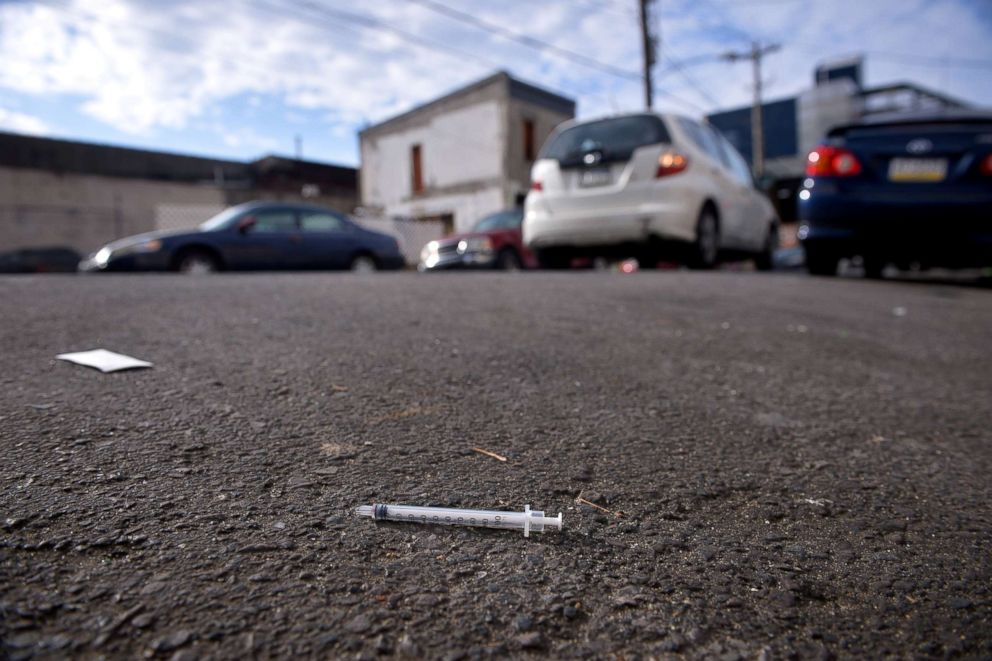Despite gains, Trump administration response to opioid crisis still faces criticism
"Cautious optimism" as Trump faces pressure to amp up response to crisis.
— -- More than four months after declaring a public health emergency over the opioid crisis, President Donald Trump made a surprise appearance at a White House summit Thursday where he suggested the U.S. should tackle the epidemic by instituting “the ultimate punishment” for drug dealers.
“You know, if you shoot one person, they give you life, they give you the death penalty," Trump said. "These people can kill 2,000, 3,000 people and nothing happens to them. Some countries have a very, very tough penalty -- the ultimate penalty. And, by the way, they have much less of a drug problem than we do.”
The president’s comments were a significant departure from the discussions at the summit prior to his arrival, which had focused largely on expanding access treatment and eliminating the “stigma” around opioid addiction.
But the moment illustrated a broader criticism of President Trump’s approach to a drug crisis that is estimated to have killed 64,000 Americans in 2016, as Congress and activists have looked to intensify pressure on the administration to take more significant action to tackle what they see as a multi-front war.
In conversations with nearly a dozen lawmakers, former members of the president’s opioid commission and others who have interacted directly with the White House’s efforts, there remains a wide consensus that, despite recent significant gains, there are continued concerns that the administration is still not yet addressing the epidemic with the urgency it demands.

A DELAYED RESPONSE
While the president appointed an opioid commission early in his administration and accepted its list of 56 recommendations aimed at ramping up the response to the opioid crisis, former members of the commission framed the administration’s response essentially as a ship functioning without its most essential crewmembers.
“I would like it to go faster, I really would, but I think we know why it hasn’t,” former Gov. Chris Christie, an ABC News contributor and former chair of the president’s opioid commission, said in an interview this week. “I think it’s been a problem with the fact that they have not had the personnel in place to be able to execute on the plan.”
The administration went more than 14 months without a permanent ‘drug czar’ tasked with leading the Office of National Drug Control Policy (ONDCP), which in previous administrations was described as essentially a command center for coordinating agencies’ responses to drug control efforts.
The first nominee put forward by President Trump, Rep. Tom Marino, withdrew his nomination in October following a damning joint report from the CBS program "60 Minutes" and the Washington Post regarding legislation he spearheaded that allegedly set up roadblocks for the Drug Enforcement Administration in taking on drug companies.
Former commission members also pointed to the sudden departure of former Health and Human Services (HHS) secretary Tom Price, who resigned in September following scrutiny of his use of expensive charter flights for official travel. Christie, in particular, described the replacement of Price by new HHS Secretary Alex Azar as a welcome move, saying Price was known for taking an “obstructionist” approach regarding the commission’s work.
Also contributing to the delay was President Trump’s own seemingly waffling response until he officially declared the opioid crisis a public health emergency. In impromptu remarks at his Bedminster club in August 2017, Trump said he considered the crisis a “national emergency,” but that verbal declaration didn’t carry any of the weight a formal declaration would have provided in terms of financial resources.
When Trump, in a national address in October, formally declared the crisis as a ‘public health emergency,’ he faced criticism because it stopped short of allocating the significant additional funds and resources that a broader national emergency would entail.
“When we get a message like the president gave and his actions speak louder than words when he doesn’t appropriate the resources, it makes a farce out of his speech,” said former Democratic congressman Patrick Kennedy, a former member of the president’s opioid commission.

‘GUTTING’ THE COMMAND CENTER IN THE DRUG FIGHT
Another overarching criticism of the administration’s approach to the crisis is what lawmakers have described as the “gutting” of the ONDCP.
In addition to its lacking a permanent leader for the first year of the administration, the president's budget proposal has called for shifting two key programs out of the office, including the the ‘High Intensity Drug Trafficking Areas’ (HIDTA) program to the Department of Justice, and the ‘Drug Free Communities Act’ to the Department of Health and Human Services, which would effectively slash the ONDCP’s budget by over 90%.
The administration has reasoned that such a move would help to reduce overlap and concentrate efforts in the departments that directly handle such issues, but the proposal has faced strong opposition on Capitol Hill.
“The president has been basically trying - his budget - they’re trying to remove that office and put the programs either over at DOJ or HHS and I vehemently oppose that initiative,” said Sen. Shelly Moore Capito, R-W.Va. in an interview.
Christie, whose commission recommendations to the president instead called for the shoring up of the ONDCP, said he’s more encouraged now that t Trump has appointed Jim Carroll as ‘drug czar’ to lead the office.
“I have spoken to [Carroll] we’re going to be meeting in the next few weeks,” Christie said. “I think it needs to be streamlined, I think it needs to be focused much more than it is, and I think Jim has the capacity to do that. The real question is is he going to have the support throughout the administration to do what needs to be done?”
NEW MOVEMENT DRAWS OPTIMISM
The administration has earned some high marks in recent weeks however, with several newly-announced steps that those close to the issue have described as matching words with action.
The president’s budget, for instance, proposed $13 billion to HHS over the next two years dedicated to combating the drug crisis, just a week after Trump signed the bipartisan budget deal passed by Congress that allocated $6 billion over two years toward the opioid epidemic.
HHS secretary Azar also has sought to speed up the process for states to apply for waivers exempting them from what is known as the ‘Institutes for Mental Diseases’ (IMD) exclusion, which previously prohibited inpatient treatment facilities from accepting Medicaid reimbursements for patients receiving addiction treatment.
At the opioid summit Thursday, Azar said he has personally appealed to governors to continue to apply for such waivers based on the expanded access that has been granted to states thus far.
Christie described the move as one of the more significant steps taken by the administration thus far.
“Thousands of treatment beds are going to be opened up because of the changes they’ve made in Medicaid,” Christie said. “ These different centers can open up treatment beds and know that they’re going to get paid the full Medicaid rate to be able to treat people and that population you’re dealing with the neediest folks.”
Earlier this week, Attorney General Jeff Sessions also announced the creation of a task force within the Justice Department known as the Prescription Interdiction and Litigation Task Force, or PILS, aimed at bringing criminal and civil penalties against opioid manufacturers who have pending lawsuits against them in several states.
The announcement was described as a potential “game-changer” by several state attorneys general, and one the president said Thursday he personally requested of Sessions, despite the recent public feud between the two that played out through the week.
“I've also spoken with Jeff about bringing a lawsuit against some of these opioid companies,” Trump said. “I mean, what they're doing and the way -- the distribution.”
ACTING ON ‘A CRISIS’
However, such recent movement has instilled what is being described as “cautious optimism” among those still calling for the administration to double down on tangible action to address the crisis.
“The problem’s not getting any better,” Capito said. “And in some cases, the experts in and around the problem predict that it’s gonna get worse so we can’t let our foot get up off the pedal here.”
Some note a disconnect in the president’s own public remarks surrounding the crisis, which has largely focused on a crackdown in ‘law and order’ and less on the need to expand treatment of opioid addiction.
When Trump evoked the opioid crisis in his January State of the Union address, he did so by tying it to his demands on immigration reform and the need for a wall along the U.S. southern border.
“These reforms will also support our response to the terrible crisis of opioid and drug addiction,” Trump said. “We must get much tougher on drug dealers and pushers if we are going to succeed in stopping this scourge.”
Sen. Maggie Hassan, a New Hampshire Democrat, said she was discouraged that Trump only visited the topic briefly and after more than an hour into his address to Congress.
“What does concern me is that the president seems just focused on the law enforcement side of things and that ignores the fact that we have a demand issue here too often fueled by the overprescribing of prescription opioids,” Trump said. “So until we address that along with the law enforcement challenges we are not going to get better.”
Trump has also publicly downplayed the role that ‘blue-ribbon commissions’ have played in addressing the problems of the epidemic, while the former chair of his own opioid commission has stressed the need for a public relations campaign that reduces the stigma associated with drug addiction and treats opioid dependency, similar to the AIDS crisis or heart disease.
“We need one of those moments where we mainstream this disease, stop thinking that it’s a moral failing but instead that it’s a disease that needs to be treated and can be treated,” Christie said. “We’ve gotta remove that social stigma, the moral failing judgment.”




